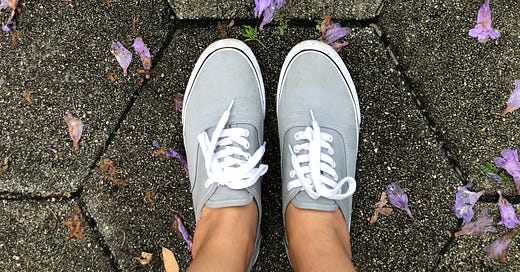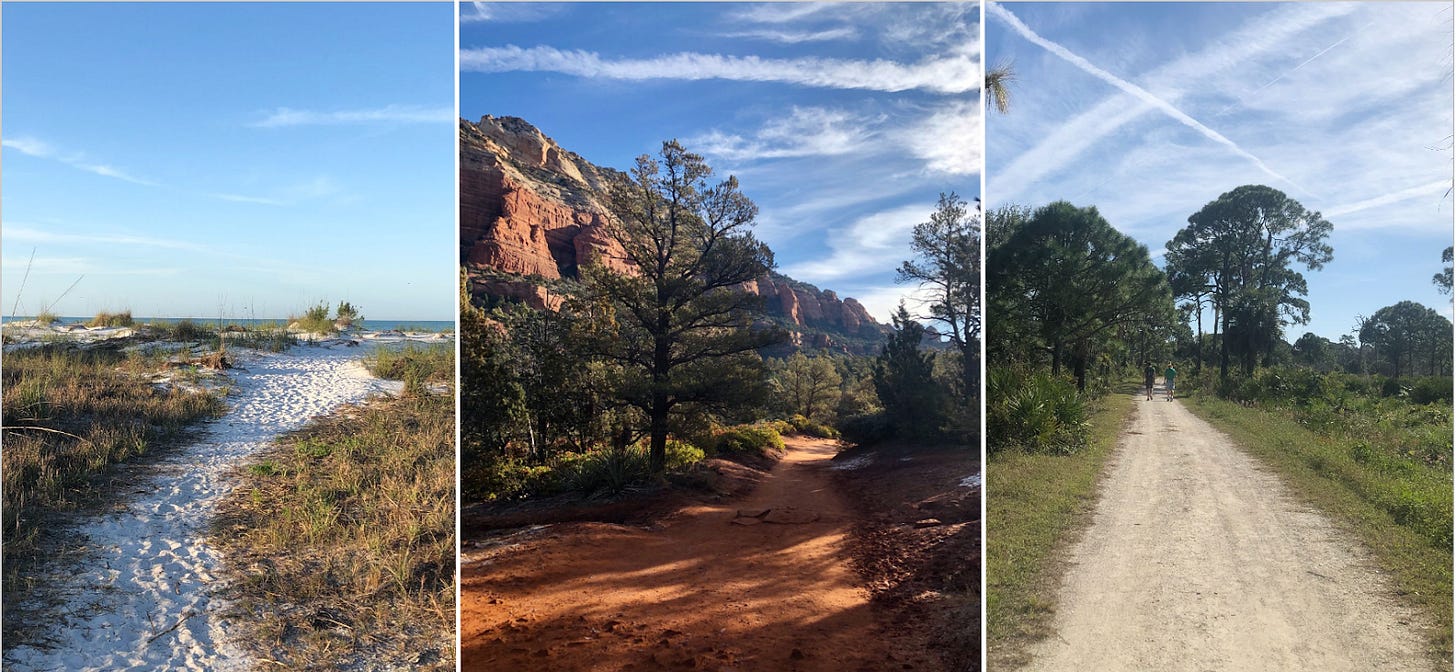As I approach 40, I’m embarking on a year-long project to reflect on the lessons I’ve learned in four decades of life. This is lesson #13. You can read the full series here.
Editor’s Note: This lesson was written from a place of able-bodied privilege. If reading about the benefits of walking is upsetting to you, please feel free to skip this one.
Grief. Heartache. Anxiety, stress. Sadness. Discouragement. Distraction, boredom, procrastination. Indecisiveness. Minor aches and pains. Uncertainty. Ennui, lethargy. Anger. Overwhelm.
This list, which reads like the side effects rattled off in a commercial for a new medication, summarizes the feelings and situations I can better handle after taking a walk.
Yes, a simple, basic walk.
The items in that list seem heavy and important. Walks, in comparison, feel light and inconsequential. Still, walking is one of the most powerful tools I have at my disposal. Sometimes I forget that.
It feels a bit silly to write about walking. What is there to say? But going on walks — long ones, preferably — is one of my favorite activities in life. It is central to who I am. If I don’t go for a walk during the day, I feel off. If I don’t go for a walk several days in a row, I’m a total mess.
A walk is not a cure-all. It’s not magic. It can’t fix anything on its own — though walking has saved me from writer’s block and dumb arguments more times than I can count. Walking is a simple, basic, necessary function. It can also ease a surprising amount of ailments.
“Above all, do not lose your desire to walk,” philosopher Søren Kierkegaard wrote in one of his many journals. “Every day, I walk myself into a state of well-being and walk away from every illness; I have walked myself into my best thoughts and I know of no thought so burdensome that one cannot walk away from it.”
A few weeks ago, facing one too many projects and not enough hours or focus remaining in my day, I decided to take a walk.
It wasn’t an ideal time. It was a hot Wednesday afternoon — a sweltering 94° Fahrenheit, with a heat index of 103° and off-the-charts humidity. It felt like wandering through a sauna. Not surprisingly, few people were outside.
I walked to my local bookstore, a mile away, where a book I’d ordered was waiting for me. Distracted, I half-listened to a podcast, half-thought about various tasks piling up, and felt fully sweaty and uncomfortable. I cursed myself for thinking a walk was a reasonable use of my time. I checked my step count, as if I needed validation that I was accomplishing something.
Driving to the bookstore would have taken five minutes. Instead, it took me 40 sweaty minutes to walk there and back.
Then something clicked. On the return trip, I removed my headphones and tucked my phone away with my book. I chose a longer, shadier route, which took me through my neighborhood park. I paid attention to my surroundings. I listened to the rhythm of my steps and the singing birds. My shoulders relaxed. A slight smile crept onto my face. I figured out a work problem that had been nagging me. And I remembered this lesson, one of the first I jotted down when I conceived of this series: A long walk can lighten most anything.
Walking can be so many things. The folks who make pilgrimages on the Camino de Santiago or trek the Pacific Crest Trail will tell you that walking is a spiritual act. The people who march in protests know that walking can be political. The countless creative individuals who have generated their best ideas on foot understand that walking is an art.
And those who are unable to walk — whether due to personal barriers, such as illness or disability, or external barriers, like oppressive heat or political unrest — might remind you how easy walking is to take for granted, how deeply missed it is when it’s gone.
Walking is one of the most basic things we do. It’s a fundamental part of who we are. As writer Nadine Monem put it, “Sometimes, walking is nothing at all — a simple, near-unconscious movement so essential to humanness that it sometimes stands in for a definition of what it means to be human in the first place.”
Walking, as Monem smartly stated, can also be subversive. It’s wholly impractical. It’s slower than running and biking, and much, much slower than driving — the preferred mode of transportation in our car-centric society. In a world that demands more, faster, walking makes little sense. It’s a form of exercise, but there are plenty of more efficient ways to burn calories and build muscle.
As Belgian artist Francis Alÿs put it, “‘Walking, in particular drifting, or strolling, is already — within the speed culture of our time — a kind of resistance.”
If I had to evangelize one thing in life, it would be walking. I adore long walks. But it can be hard to hype up something so simple, so basic, so potentially boring. Walking is slow, and our time is precious and limited.
Then I realized (on a walk, of course) that perhaps we’re looking at walking the wrong way. Instead of asking what it gives us — what we will gain — what if we consider how walking might help us let go?
For me, walking eases most anything. When it comes to clearing my head and generating new ideas, walking is the best. When I need to reduce stress or step away from a heated moment, walking is tops. When I want to appreciate my surroundings and find gratitude, walking is the key. Without fail, a long walk leaves me feeling lighter.
Walking, in all its slow purposefulness, is a form of wisdom, and Kierkegaard was wise indeed: “If one just keeps on walking, everything will be all right."
And with that, I’m going to take a walk.
xoxo KHG
p.s. Several of the quotes from today’s essay came from Afoot and Lighthearted: A Journal for Mindful Walking, which makes for a lovely gift. Thank you, Meredith, for knowing me so well!








My fondest memories were walking up and down the streets of Boston in the middle of the summer, sweating profusely, trying to figure out life.
Fully agree. Walking is where I unlock a lot of things: good ideas, stiff joins, existential dread, all of it. Especially the ideas, as you note. It seems to be the effect of ramping up the body into a mildly energetic state but giving the brain (which is also the body) nothing to do - it gives your mind some restless energy so it subconsciously starts working on problems you've been struggling with. (I think the same is true with doing household chores.)
A book I will thoroughly recommend on the subject, which also goes into walking as an act of political activism - https://www.amazon.com/Walking-Life-Reclaiming-Health-Freedom/dp/0738220167 - by Antonia Malchik, who is on Substack at https://antonia.substack.com/